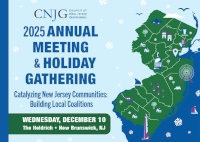Site Search
- resource provided by the Forum Network Knowledgebase.
Search Tip: Search with " " to find exact matches.
PSE&G and the PSEG Foundation, committed to building thriving communities, today announced $1.5 million in grants to over 25 local organizations that provide critical assistance to households facing economic hardship. The initiative is unveiled...
The Executive Director will stabilize, strengthen, and elevate an organization emerging from several years of transition. Reporting to the Board, this hands-on leader will work with consultants and the board to advance the mission, restore member...
Hosted by United Philanthropy Forum, in partnership with the Council on Foundations...
 Catalyzing New Jersey Communities: Building Local Coalitions
Catalyzing New Jersey Communities: Building Local Coalitions
Wednesday, December 10, 2025 - 10:00 am to 3:00 pm...
Theresa Jacks, President and CEO
...The Hyde and Watson Foundation approved $3,164,000 in grants to 301 organizations for the Fall 2025 grant cycle. The Foundation awarded a total of $6,461,180 to 605 organizations in 2025. A current list of grants can be found on the...
The F. M. Kirby Foundation Board of Directors announced that 269 grants totaling $17,052,062 were paid in 2025 to nonprofit organizations working to increase the strength and vitality of their communities.
A total of 167 grants provided...
The Princeton Area Community Foundation teamed up with two other New Jersey-based foundations to provide $155,000 in Critical Needs Grants to local nonprofits facing funding cuts and increased demand for services.
The program was created...
As we step into 2026, I wanted to start with heartfelt gratitude. Thanks to the generous and unwavering support from you, our members, CNJG has continued to grow and thrive, even in the face of a challenging year for our...
As the year comes to a close, I’ve been thinking about the conversations I have had with many of you over the years, in meetings, at programs, and sometimes in those unplanned moments before a convening. Time, and time again, I hear a version of the...
In this webinar, we will explore how family philanthropies can unlock their full philanthropic potential by aligning both traditional and nontraditional vehicles with strategic intent. This session will walk you through how to make use of and combine...
Join us for an interactive session that will examine how typical funder-grantee relationships often reproduce power imbalances, and how thoughtful shifts in mindset, practice, and structure can foster genuine trust, deeper collaboration, and more...
How did we get here? Where do we want to go?
Join NCFP’s president and CEO for a wide-ranging conversation on the state of the family philanthropy sector. We will reflect on our current context and identify what actions family philanthropies...
Join us to explore how intentional practices of listening can help shift power between philanthropic families and their partners, within grantmaking relationships, and among communities that funders serve; deepen relationships; and support equitable...
New Jersey’s housing, land use, and education policies are at a turning point. Decisions made today will shape how we grow, where we live, and how we prepare the next generation. The Fund for New Jersey and the Princeton School of Public and...
CNJG, in partnership with the Center for Nonprofits, is thrilled to invite you to a virtual launch event to celebrate the debut of the New Jersey Philanthropy Hub—a groundbreaking, one-stop platform for understanding and strengthening philanthropy in...
CNJG, in partnership with the Center for Nonprofits, is thrilled to invite you to a virtual launch event to celebrate the debut of the New Jersey Philanthropy Hub—a groundbreaking, one-stop platform for understanding and strengthening philanthropy in...
With the recent passage of the federal budget bill that slashed Medicaid and food assistance for millions of Americans while directing $170 billion to border militarization and the surveillance, detention, and deportation of immigrants, it is clear...
How can a place-based approach maximize philanthropic impact and drive meaningful, community-led progress?
In this session we will consider the power of place-based funding and the unique opportunities it presents for achieving impact at scale...
We know that funders face many challenges when attempting to make the case within their institutions for the value and importance of investing in immigrant communities. We also know that moving money to immigrant-led and immigrant-centered...
